Photographs: Sreeram Selvaraj Shobha Warrier in Sriperumbudur
There was a time, not so long ago, when Sriperumbudur was a sleepy village known only for the tragic incident that happened there; the assassination of former prime minister Rajiv Gandhi.
Today, the face of the once unknown village has changed. Lined up on either side of the four-lane National Highway 4 (going to Mumbai from Chennai) are huge factories of multinational companies like Hyundai, Nokia, St. Gobain, et cetera.
There are the special economic zones too on the highway. Tucked inside one of the SEZs are multinational companies like Motorola, Dell, among others.
The manufacturing facility of Dell in Tamil Nadu was started with an investment of $30 million in December 2006 over a 50-acre site. This was the MNC's third such facility in the Asia-Pacific Region.
As you enter the premises, it gives you the feeling of any other big company with stringent questioning, checking and frisking. But in reality, this company is different.
. . .
How Dell's job strategy is changing lives in rural India!
Image: M R Sundaresan, executive director, Dell India Pvt. Ltd.Photographs: Sreeram Selvaraj
All the 500 employees who work as operators in the assembly lines that manufacture desktops, laptops and servers are from the rural areas of Tamil Nadu and Andhra Pradesh.
All of them are from economically backward families and 50 per cent of them are women.
When Dell decided to start its operations in Tamil Nadu, the state government wanted the company to operate from a rural area.
Dell was in a dilemma as the unit had to be near a seaport and an airport. Also, those in the higher managerial level preferred staying in an urban area.
"As we are driven by business requirements to deliver our products, we chose to be close to Chennai," M R Sundaresan, executive director, Dell India Pvt. Ltd, said.
. . .
How Dell's job strategy is changing lives in rural India!
Image: Lakshmipathy from Kadappa.Photographs: Sreeram Selvaraj
"If we could not locate ourselves in rural India, we thought we could at least get majority of the employment from rural India. That way, we felt we would be able to satisfy the government. We also felt by doing so, we could make some difference to the lives of rural people," he said.
And make a difference, it did. Take for example 22-year-old Madhavi from Andhra Pradesh who could not study after her Plus Two because of poverty.
Her mother, who worked as a coolie at construction sites could not afford to send her children for higher studies. It was while she was working in a small financial firm that she saw an advertisement and applied to Dell and got the job.
"I joined in 2008. My salary in the financial firm was Rs 600 but today, I send Rs 3,000 to my mother every month and I educate my younger brothers."
In 2007, Dell hired the first batch of 60 people from rural Tamil Nadu. How Dell selected talent from rural Tamil Nadu, mainly from the southern part, was by approaching the school principals.
. . .
How Dell's job strategy is changing lives in rural India!
Image: Aadilakshmy from Koyilpatti, a village in Tirunelveli.Photographs: Sreeram Selvaraj
Out of the 500 resumes given by the principal, 150 were selected based on a written test. After interview, 60 were selected. The candidates consisted of an equal number of men and women.
The two criteria for selection were that the youngsters had to be academically bright and also had to be from a poor family, so that the job would make a difference to the family.
They also wanted students who had the ability and passion to study further and the right attitude to grow further in their career.
Dell, Sundaresan says, subsidises 70 per cent of the tuition fee and also gives them time off to write exams.
Twenty-year-old Rahul from Guruvayoor, like many other youngsters, wants to make use of this opportunity.
. . .
How Dell's job strategy is changing lives in rural India!
Image: Rahul from Guruvayoor.Photographs: Sreeram Selvaraj
He was quite disappointed when he did not get admission to study Electronics. He then decided to take a Diploma in Hardware. That was when he came to know about Dell from another person who was working in the IT department of Dell.
"I came over here and gave the test. I did well in the test and the interview, and was inducted in December 2009. After a week's training, I joined the assembly line to manufacture computers. What makes me happy here is that the company lets you learn whatever you want and, now, I analyse problems and rectify them. I am happy that I came over here."
Rahul has already started studying for B.Com so that he could take an MBA after that. "I could not study further when I was in Kerala. Now that I am getting a chance, I do not want to let go of that. Even if you study, there is no guarantee that you will get a job in Kerala. Here, I am working and also studying. Where else will I get such an opportunity?"
Today, 20-25 per cent of the 500 young men and women from rural Tamil Nadu and Andhra Pradesh have enrolled themselves in graduate programs like B.Sc, BBA, B.Com, etc, through correspondence courses.
. . .
How Dell's job strategy is changing lives in rural India!
Image: Selvi.Photographs: Sreeram Selvaraj
When the executive director found that the quality of those selected in the first batch was very good, they decided to follow the same method again.
"What we looked at primarily was the attitude towards work. We were very, very happy with the kind of people we got in the first batch," the executive director commented.
Interestingly, most of those who joined Dell had not travelled more than 10 km from their village till then. For the first time in their lives, they travelled 300-400 km to reach Chennai.
When 22-year-old Aadilakshmy from Koyilpatti, a village in Tirunelveli, was selected in 2008, she was over the moon though the thought of going to a far off city scared her at first.
. . .
How Dell's job strategy is changing lives in rural India!
Image: Kanakraj.Photographs: Sreeram Selvaraj
Till then she had not travelled outside her village but what gave her confidence was the fact that there were many others from her village who were also selected.
"Many girls from my village were selected in the first batch also. So, even after coming here, I never felt I was far away from my village."
Once selected, the first two weeks were spent on giving them life skills training, starting with personal hygiene and life in a metro. The HR team of Dell tied up with a person to run a dormitory for the company and also inspected the places the employees were going to stay in Sriperumbudur.
That was to verify whether the places were safe and neat and the food quality was good.
. . .
How Dell's job strategy is changing lives in rural India!
Image: Two girls work at the Dell laptop assembly line in Sriperumbudur.Photographs: Sreeram Selvaraj
"We even opened bank accounts for them. We also told them not to blow up all the money in T Nagar (the entrenched shopping district in Chennai) in one day. We provided two meals a day at the factory and transport to the factory from the place they lived in; all free. We ensured that they are comfortable. We were only worried about how they would adjust to the new environment which was totally different from the one at the village they are used to. . . but all of them settled down very well and easily," Sundaresan said.
In eight weeks' time, the company could put them in the assembly line to build computers. The physically more taxing work was done by men, while the laptops which require more dexterity are assembled by women.
When they found that the model was quite successful, more and more people were recruited, but this time from the rural parts of Andhra Pradesh too.
Today, Dell has 500 young people with an average age of 19-20 working on the assembly lines. The capacity of the factory was half a million units when they started in 2007, now it is close to 2 million.
. . .
How Dell's job strategy is changing lives in rural India!
Image: Rural Indians working at the Dell assembly line.Photographs: Sreeram Selvaraj
The biggest advantage in recruiting people from rural India, according to Sundaresan, is that "the attrition levels are quite low. The enthusiasm and passion to work is high in them and also, the affinity to the company is very high. We have not lost a single person to another company. Except to get married, people have not left the company."
Today, Aadilakshmy sends Rs 5,000 every month to her parents and she is sure about one thing. "I have decided not to marry so soon like all villagers do. If I were to get married also, I will tell my man that only if he let me continue to work here, would I agree to marry him! This job is very important to me. My opinion on marriage changed after coming here and meeting so many people."
Twenty-two-year-old Lakshmipathy from Kadappa is sure about one thing: that he will work "only at Dell and at no other place."
He joined Dell when he was doing his final year of graduation, which he has completed by now. His dream now is to do an MBA. He manages to send home Rs 4,000 to Rs 5,000 every month and it helps his daily wage earning parents a lot.
. . .
How Dell's job strategy is changing lives in rural India!
Image: Rural Indians working at the Dell laptop assembly line in Sriperumbudur.Photographs: Sreeram Selvaraj
The story of 20-year-old Kanakaraj is also no different from that of the others. Despite scoring good marks, he could not pursue his dream of studying engineering as his family was quite poor.
It was a dream come true for him when he was selected in 2008 "to work in such a big company after completing just Plus Two. I want to do my graduation as the company will help me in it."
Twenty-year-old Selvi also could not join college despite getting good marks only because she was very poor. She now wants to educate her two brothers.
"I don't want them to stop their studies like I did. Now that I am working, they need not worry at all. My dream was to study nursing but then my parents could not educate me. My brothers want to join army. I will see to it that they realise their dreams," says Selvi.
. . .
How Dell's job strategy is changing lives in rural India!
Image: The assembly line at Dell's Sriperumbudur factory.Photographs: Sreeram Selvaraj
She has told her parents that she would not get married until her brothers are properly educated. She also wants to continue her studies through correspondence. "I am happy that Dell encourages us to do that."
Ramya Balakrishnan, the HR manager, also vouches for their commitment. "They are very loyal and committed. I joined Dell only recently and I enjoy being with these people. You get energised watching them work. This I don't think I would have felt if I were to work with people from urban India. It is personally fulfilling working with these people as you are contributing to somebody's future."
Almost 85-90 per cent of what is made at the Sriperumbudur factory is for the Indian market and about 15 per cent gets exported to the Middle East.
Of all the factories of Dell across the world (China, Malaysia and Brazil), only in India has the company recruited people from rural areas as a policy. When compared to the output across the world, Sundaresan says that the Indian factory is as productive as any other factory in the world.
"This model of recruiting economically backward young men and women from the rural areas has got a lot of appreciation worldwide. Dell may explore this model in other parts of the world too."


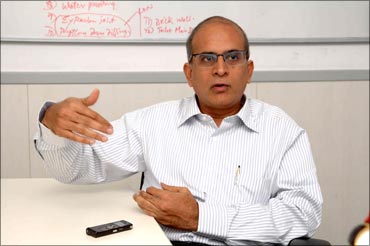



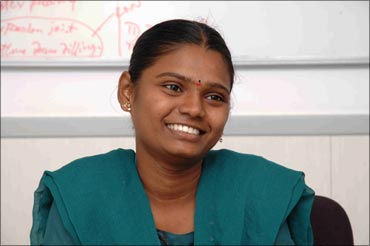
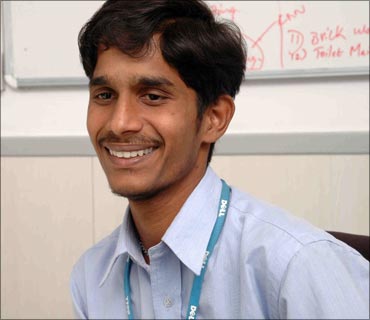
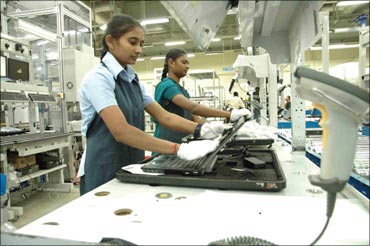
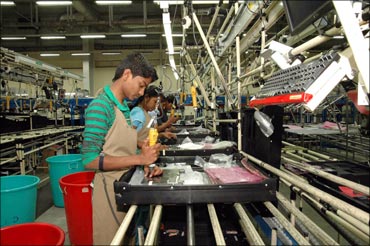

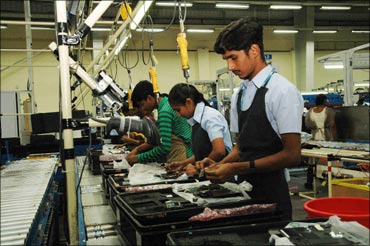
article